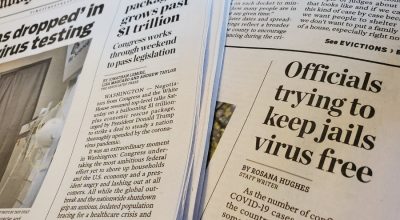

If state government goes whole hog for the panic button, it will have to operate in the air, as it were, without its feet planted legally on the ground as it violates your rights under the constitution.
By David Tulis / NoogaRadio 92.7 FM
But in an executive order today, Gov. Bill Lee acts circumspectly to avoid violating en masse the God-given rights of the people of Tennessee. His feet, it appears, remain on the ground.
In a five-page order, No. 17, he gives clear limits of his authority, one past which he won’t go. “This order does not mandate sheltering in place and does not prohibit persons from visiting places necessary to maintain health and economic well-being, including grocery stores, gas stations, parks and banks, among other places, so long as they observe the necessary precautions” advised by the Centers for Disease Control.
“All critical infrastructure remains operational, and government entities and business will continue providing important and essential services,” Gov. Lee says. The rules in the order expire April 6.
Gov. Lee takes one step toward arbitrary power — limiting the size of gatherings by edict: “Persons shall not participate in social gatherings of ten (10) or more people.” He also bans operation of gyms and eat-in areas of restaurants.
The Lee ban on gatherings of 10 or more people implicates the bill of rights, and would make impossible people getting together to exercise rights of free speech, religious worship, charitable activity or organizing for petitions for redress of grievances. If not allowed to expire, such provisions are the heart of any modern police state.
“I recommend that the governor make sure his executive orders are in line with the Tennessee Constitution before he executes them,” says Jim Poe of Springville, Tenn., a Christian activist. “This has specific reference to limiting ‘social gatherings’ to 10 or more people, especially as it relates to public gatherings to worship.”
He cites the bill of rights, section 3, “That all men have a natural and indefeasible right to worship Almighty God according to the dictates of their own conscience; *** that no human authority can, in any case whatever, control or interfere with the rights of conscience; and that no preference shall ever be given, by law, to any religious establishment or mode of worship” and section 23 that holds “the citizens have a right, in a peaceable manner, to assemble together for their common good, to instruct their representatives, and to apply to those invested with the powers of government for redress of grievances, or other proper purposes, by address or remonstrance.”
Commerce — origin of state civil power
The only way the state today can touch an individual and make a claim upon him is through its privilege enforcement system. In other words, the state has nothing to do with you, an ordinary person, nor you with it, apart from a single important fact.
And that is whether you are exercising a state privilege of some kind or a privilege granted by one of its subdivisions such as a city or county. If you are, it has authority over your activities in those areas touched by the privilege or special favor.
A privilege is a grant to do something that, apart from the license that evidences the privilege, would be unlawful or illegal. All privileges are discriminatory and exclusive, they apply to commercial activities in the way of trades, professions or callings.
In countries with common law systems such as ours, a man or person can be subject to the state in one of two ways.
The most obvious way is if he commits a crime, acts in violation of a provision in Tenn. Code Ann. Title 39, the criminal code. The second way: If he violates the rules of his license or privilege.
These are the people who, pursuant to Romans 13, are to fear the magistrate on account of their having committed an evil act. As St. Paul says, “For rulers are not a terror to good works, but to evil. Do you want to be unafraid of the authority? Do what is good, and you will have praise from the same. For he is God’s minister to you for good. But if you do evil, be afraid; for he does not bear the sword in vain; for he is God’s minister, an avenger to execute wrath on him who practices evil” vv. 3, 4.
So, people become subject to state claims against them either by committing a crime or violating the rules of the Tennessee code, through which the state administers its government through any of numerous executive agencies.
But there is a third way people in Tennessee might become subject to state edicts — apart from a crime, apart from any commercial privilege subject to state regulation and enforcement.
And that would be in a riot, insurrection or emergency, such as that enacted in Tennessee last week by Gov. Lee.
If emergency creates new ‘crime’
My question is how does the officer legally assume power over a person who does not commit a crime or a breach of the peace in his presence? How does he command an individual and arrest an individual who is not sick and who has not committed a crime?
We appear to be entering this phase of the virus panic in which arbitrary capricious government becomes the rule rather than the exception.
We may be coming into a time in which police have arrest and detention powers and sheriff’s departments will be creating holding camps for arrestees who are in some way offending their officers’ claims be able to order people about and force them to go where they don’t want to go.
Under the claim of emergency and necessity, what officer can do wrong? Under the unseen threat of a virus in which every person may be viewed with suspicion, who is to say an officer acts unjustly? When everybody is in a panic, and every person is viewed as a lethal threat because of negligence or disobedience, how can an extra judicial execution not be accepted as a momentary necessity allowed in the circumstance?
The constitution of Tennessee and United States envision the existence and benefit of ordered liberty. People are generally at liberty unless they commit a crime or a tort. Crime is a wrong described in statute, with a state presumably the victim and liable to prosecute by indictment. A tort as their private wrong actionable by the victim in a civil case, hiring a private attorney (usually).
As executive orders spray out from governors’ pens across the country locking people into their houses, barring their wanderings and pleasures, shutting down their means of livelihood, a question comes into view. What about long-term damage to constitutional rights? Damage to private property? Takings without offers of compensation? Bans on innocent, harmless and God-obedient duties such as making a living?
The more the state takes control of public life and private life, the more certain the ruin will be among the people, probably medically and certainly financially and in terms of callings and professions and the gathering implosion of the U.S. economy as millions of people are forced out of work and companies shutter their gates..
‘That’s not going to happen’
Chattanooga police chief David Roddy, in a March 19 FB post describing an early Mayor Berke order, No. 2020-02, says “your officers are an educational point right now, not an enforcement tool.” They will surveil businesses, then communicate “next steps” about “other entities that will become involved” to goad any businessperson into oedience.
He says he wants viewers “to understand that your police department’s last item is any type of enforcement model. It’s not police officer’s showing up at a gym tomorrow morning, and locking the doors with chains and dragging people out in spandex and out of a yoga class in handcuffs. That’s not going to happen.”



SO MUCH FOR THE RULE OF LAW NOT MAN
Does anyone really think/believe law is in control in this so-called crisis/virus?
Law just doesn’t come raining down from nowhere. It is like most everything. Law has a source. Law has two main sources. GOD OR MAN.
Law does not rule. Never has, never will. So you can’t blame all this scandalous and out-of-control demagoguery on law. At least not real law. Most real law is not manmade law.
You want to tell me and make me believe that if we did not have all the millions of manmade law and rules and regulations we would not be able to function as a society?
Well we are not functioning as a society. We are being destroyed, led to our own destruction by all of this manmade law. Show just one REAL law that will destroy people’s livelihoods. Their jobs. Their ability to support their families and themselves. You say it is done to help stop spreading a disease — a virus.
Folks, if you believe the best way not to spread a disease is to take away peoples livelihood I have a question. What flavor of kool-ade have you been drinking?
Most men can’t control themselves, let alone someone or everybody else. How do I know this? Well, just look at all the so-called laws, rules and regulations man has created for himself to do what he can’t do. Control himself.
The government (man) is all ready in control of our livelihood. What is happening now is just more proof.
Man got control of all our livelihoods back around 1913 when government stole WE THE PEOPLE’S money. Then government turned around and gave our source of money to a federal reserve system. The so-called money now belongs to the government, not us, THE PEOPLE.
Money is one of the greatest sources of power. The government not only stole our money they stole the source of power we had over government.
Honest to God, people. I have a 2-year-old great-grandson that relatively speaking displays more brain power than most adults I know.
Maybe it is time to try something else. TURN BACK TO GOD’S LAW. IT WORKS. He can and will provide for all your needs.
You ask how can I get over/around all the manmade laws? Turn back to living your life by HIS LAW and HE will and can do it for you. Or just keep being led to your own destruction by man.